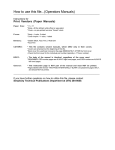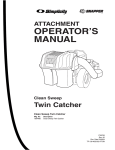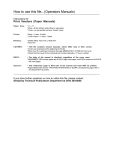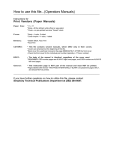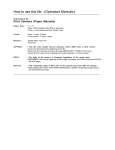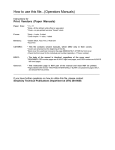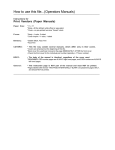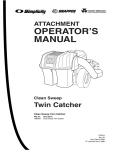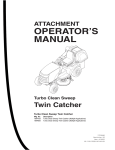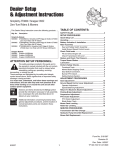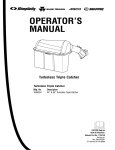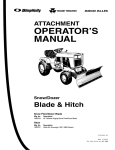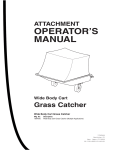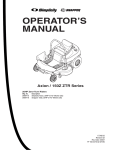Download Simplicity 1694498 Printer User Manual
Transcript
How to use this file...(Operators Manuals) ————————————————————————————————————————————––– Instructions for Print Vendors (Paper Manuals) Paper Size: * 11 x 17 * Body—50 lbs brilliant white offset or equivalent. * Cover—on pre-printed two-tone “Swash” stock. Press: * Body—1-color, 2-sided * Cover imprint —1-color, 1-sided Bindery: * Saddle Stitch, Face Trim * Face Trim COVERS: * This file may contain several manuals, which differ only in their covers. * Covers are all present at the beginning of this file. * Back cover for a particular manual is the page IMMEDIATELY AFTER the front cover. • Check the front cover for the individual part number (typically a 171xxxx number). BODY: • The body of the manual is identical, regardless of the cover used. * REMEMBER: ODD number pages are ALWAYS right hand pages, and EVEN number are ALWAYS left hand pages. General: * This instruction page is NOT part of the manual and must NOT be printed. • Pages labeled with the text “THIS PAGE INTENTIONALLY BLANK” are placement pages ONLY, and should NOT be printed. ————————————————————————————————————————————––– THIS PAGE INTENTIONALLY BLANK ATTACHMENT OPERATOR’S MANUAL Clean Sweep Twin Catcher Clean Sweep Twin Catcher Mfg. No. 1694498 Description Clean Sweep Twin Catcher 1726793 Rev. 02 Rev. Date 03/2004 TP 100-4033-02-AT-SN MANUFACTURING, INC. 500 N Spring Street / PO Box 997 Port Washington, WI 53074-0997 www.simplicitymfg.com © Copyright 2004 Simplicity Manufacturing, Inc. All Rights Reserved. Printed in USA. Table of Contents Safety Rules & Information General Warnings............................................2 Safety Decals ..................................................2 Storing the Grass Catcher ...............................3 Initial Collector Assembly Install Cover & Bags ......................................13 Normal Removal & Installation Removing the Grass Catcher ........................14 Installing the Grass Catcher ..........................15 General Operating Information Before Operation .............................................3 Mowing with the Catcher .................................3 Required Accessories......................................3 After Operation ................................................3 Storing the Grass Catcher ...............................3 Hardware Identification & Torque Specifications....................................16 NOTE: In these instructions, “left” and “right” are referred to as seen from the operating position. Initial Turbo Installation Contents Turbo Installation Kit...............................4 Turbo Installation ...................................................5 Initial Counter Balance & Front Weight Carrier Installation Counter Balance Installation ...............................10 Front Weight Carrier Installation ..........................10 Initial Hitch & Tube Installation Install Hitch Plate & Back Plate ...........................11 Assemble Tubes & Deflector ...............................12 Assemble Catcher Bags ......................................12 1 Safety Rules & Information Read these safety rules and follow them closely. Failure to obey these rules could result in loss of control of unit, severe personal injury or death to you, or bystanders, or damage to property or equipment. The triangle in text signifies important cautions or warnings which must be followed. GENERAL WARNINGS • Know the unit’s controls and how to stop quickly. READ THE OPERATOR’S MANUALS. • Read and obey all safety decals. • Only allow responsible adults, who are familiar with the instructions, to operate the unit. • Disengage the PTO. Shut off the engine and wait for all moving parts to stop before attaching, adjusting, or disconnecting any part of the collection system. • Check the collection system to make sure it is bolted tightly to the unit. • DO NOT operate the unit without either the entire grass catcher or the deflector in place. • Turn off the PTO to disengage the blades when not mowing. • DO NOT mow in reverse. Always look down and behind before and while travelling in reverse. • DO NOT turn sharply when travelling alongside a building or any object. Slow down before turning. • DO NOT carry passengers. • When collection system is removed from the mower deck, the deflector must be properly installed. • Collector bags are subject to deterioration and wear during normal use. Inspect the bag periodically for tears, holes, or weak spots and replace with a new bag that meets manufacturer’s durability standards. • If the mower stalls or the collector chute plugs: 1. Disengage the PTO; 2. Stop the engine and remove the key; 3. Set the parking brake, and wait for all moving parts to stop. 4. Remove the foreign object or clear the chute with a piece of wood before restarting the engine. NEVER place hands into COLLECTOR OR MOWER housing to clear jammed objectS. Blower OR MOWER may rotate when object is removed. • For added stability and to prevent tipping or loss of control: a. Use reduced speed on uneven ground and when turning corners. b. Reduce loads on hillsides. It is recommended that the collection system be kept only half full when negotiating any slopes. Start mowing on slopes when the collection system is empty. c. Mow up and down the face of slopes; never across the face of any slope. • When operating on slopes, use front counterweights. Never operate on slopes greater than 17.6% (10°). SAFETY DECALS These labels are easily applied and will act as a constant visual reminder to you, and others who may use the equipment, to follow the safety instructions necessary for safe, effective operation. This unit has been designed and manufactured to provide you with the safety and reliability you would expect from an industry leader in outdoor power equipment manufacturing. ATTACHMENT DECALS Although reading this manual and the safety instructions it contains will provide you with the necessary basic knowledge to operate this equipment safely and effectively, we have placed several safety labels on the unit to remind you of this important information while you are operating your unit. All DANGER, WARNING, CAUTION and instructional messages on your rider, attachments and mower should be carefully read and obeyed. Personal bodily injury can result when these instructions are not followed. The information is for your safety and it is important! The safety decals below are on your product. Decal - WARNING Do Not Open Cover Part Number 1704405 Decal - WARNING Part Number 1717291 If any decals are lost or damaged, replace them at once. See your local dealer for replacements. Read and obey all operation and warning decals. TP 600-2562-01-AT-SMA 2 General Operating Instructions BEFORE OPERATION Clear the lawn of all sticks, stones, wire and other debris which may be caught or thrown by the mower blades. Check grass condition. If wet, wait until later in the day. If grass is wet, the grass catcher is likely to become plugged. For efficient bagging, air circulation under the mower deck, through the chute and into the bag is very important. For this reason, BEFORE YOU BEGIN MOWING you should make certain the underside of the mower and the underside of the catcher lid are free from grass and debris. Make sure that there is a snug fit between mower deck, blower housing, tubes, and grass catcher cover. MOWING WITH THE CATCHER REQUIRED ACCESSORIES Always operate with throttle at full speed when mowing. A front-mounted factory approved weight carrier and 66 lbs. worth of weights are required when using this rearmounted grass catcher. Never operate on slopes greater than 17.6% (10°). Grass should be cut often, and not too short. If grass is too long or lush it may be necessary to keep ground speed to a minimum or to cut only half the width of the mower to prevent clogging. If grass is long, operate with mower in high cutting position for first pass, cutting again in a lower position on a second pass. AFTER OPERATION Do not open the cover with mower engaged. CAUTION If a large amount of cut grass is spilling out from under deck, the tube may be plugged or the bags may be full— discontinue mowing, stop the unit, disengage the PTO, shut off the engine and then empty the catcher or clear the tube. Do not leave grass in bagger containers. Empty containers after each use and before storing. Failure to do so may result in spontaneous combustion which could develop into a fire. WARNING Remove any debris from the the screen on the underside of the lid. Note: The lid screen can be partially removed for easier cleaning and should be cleaned regularly. ALWAYS shut off the tractor. Disengage the PTO, and allow all moving parts to stop BEFORE disconnecting or clearing tube, or emptying catcher. The blower housing and tube should be removed for cleaning. Before leaving the operator’s position for any reason, engage the parking brake, disengage the PTO, stop the engine and remove the key. Inspect the grass bags for wear or damage. Make sure that there is a snug fit between mower deck, blower housing, tubes, and grass catcher cover. To reduce fire hazard, keep the engine, rider and mower free of grass, leaves and excess grease. Do not stop or park rider over dry leaves, grass or combustible materials. STORING THE GRASS CATCHER Clean the grass catcher thoroughly using a mild detergent (other products may damage the tube). Remove any debris from the the screen on the underside of the lid. CAUTION Before you begin operating the unit be certain you have read all of the safety and operational information of this instruction sheet, as well as the Operator’s Manual for the tractor and any other attachments. If paint has been scratched on metal parts, touch up with paint, or apply a thin film of oil to prevent corrosion. Store in a dry area. Dry thoroughly before storing for a long period of time. Always store away from moisture. 3 Initial Turbo Installation Torque to 55-70 ft. lbs. 12 11 44" 49 24 35 25 10 18 1 50" 18 17 2 19 20 33 1 16 3 27 2 4 7 Existing Pulley & Spacer 23 15 48 26 22 8 9 29 21 14 8 13 36 32 31 37 30 6 22 38 39 5 Existing Hardware 27 45 47 46 27 34 27 8 17 38 44 22 43 28 42 Existing Hardware (Bolt, Washer, Lockwasher, & Nut) 41 40 Ref. Qty. Description 1 2 3 4 5 6 7 8 9 10 11 12 13 14 15 16 2 6 1 4 1 4 1 4 1 1 1 1 1 1 1 1 CAPSCREW, Hex Head, 5/16-18 x 1 WASHER, 5/16 SUPPORT, Belt Cover NUT, Hex, Nylon Lock, #10-24 ROD, Deflector SCREW, Truss Head, #10-24 x 3/4 PIVOT ASSEMBLY NUT, Hex Whizlock, 5/16-18 NUT, Nylock, Hex 5/16-18 COVER-BELT 50" DECAL, Warning COVER-BELT 44" NUT, Hex, 3/8-16 LOCKWASHER, 3/8 BRACKET, Idler LATCH, Belt Cover 17 18 19 20 21 22 23 24 25 26 27 28 29 30 31 32 33 2 1 1 1 1 3 1 1 1 1 1 1 1 1 1 1 1 WASHER, Flat, 3/8 CAPSCREW, Hex Head, 3/8-16 x 2 PULLEY ASSEMBLY, Idler BELT STOP CAPSCREW, 5/16-18 x 1-1/2 LOCKWASHER, 5/16 SPACER NUT, Sleeve WASHER, Belleville PULLEY HUB PLATE ,Spring Support SPACER, Pulley CAPSCREW, Hex Head, 5/16-18 WASHER, 5/16 LATCH, Spring SPACER Figure 1. Contents of Turbo Installation Kit 4 Existing Hardware 34 35 36 37 38 39 40 41 42 43 44 45 46 47 48 49 1 1 1 1 2 1 1 1 1 1 2 1 1 1 1 1 WASHER,3/8 V-BELT, 50” Turbo NUT, Hex Lock, 5/16-18 NUT,Wing, Special, 5/16 NUT, Hex, 5/16-18 BRACKET, Anchor CARRIAGE BOLT, 5/16-18 BRACKET ASSEMBLY, Cutoff SPACER BRACKET CAPSCREW, Hex Head, 5/16-18 x 7/8 CARRIAGE BOLT, 5/16-18 x 3/4 SPRING, Compression SPACER, Spring Holder BRACKET, Mounting V-BELT, 44” Turbo Initial Turbo Installation TURBO INSTALLATION Remove Mower Deck Remove the mower deck from the unit (see Operator’s Manual for instructions). A Deflector Removal 1. Remove and retain the carriage bolts, washers, lockwashers, and nuts (A, Figure 3) holding the deflector rod to the deck. Remove and discard the deflector rod. Retain the deflector. Figure 3. Remove Deflector A. Carriage Bolts, Washers, Lockwashers, & Nuts Install Discharge Baffle B 1. Attach the baffle bracket (A, Figure 4) under the mower housing as shown, and insert the carriage bolt (from step 1) through the bracket & deck hole at (B). C 2. Attach the “L” bracket (C) to the baffle (A), and over the stone guard (D). Attach with carriage bolt, spacer, lockwasher and nut as shown. D A Figure 4. Install Discharge Baffle A. Baffle Bracket C. L-Bracket B. Mounting Hole D. Stone Guard A B A C D Figure 2. Install Discharge Baffle A. Cover and Bolts E Install Deflector Hinge Assembly 1. Remove the bolts (A, Figure 2) securing the RH arbor cover, then remove the cover from the deck. Discard the cover and bolts (A). F 2. Remove and discard the plastic plugs from the deck at the locations used by bolts (F & B, Figure 5). 3 Slide the deflector rod (D) through the pivot bracket (E). G 4 Secure the front of the pivot bracket with a 5/16-18 x 3/4” carriage bolt (F) and flange whizlock nut (C). C Figure 5. Install Deflector Hinge A. Belt Cover Support F. 5/16-18 x 3/4 B. 5/16-18 x 1 Capscrew Carriage Bolt C. 5/16-18 Whizlock Nuts G. 5/16 Washer D. Deflector Support Rod E. Pivot Bracket 5 Secure the back of the pivot bracket (E) and belt cover support (A) with a 5/16-18 x 1 capscrew (B), 5/16 washer (G), and flange whizlock nut (C). 5 Initial Turbo Installation Install Deflector B 1. See Figure 6. Drill four 13/64” holes from the bottom of the deflector at the pre-molded drill points (A, bottom of deflector). 2. Attach the deflector to the support rod wire-form using four #10-14 x 3/4 truss head screws and nylock nuts. A C Figure 6. Install Deflector A. 13/64 Hole Locations B. Nylock Nuts C. Screws, #10-24 x 3/4 Install Belt Guide 50” Models 1. See Figure 7 & 8. Locate the taptite screw that will be replaced by capscrew (C). Remove and discard the taptite screw E D 2. Assemble the 5/16-18 x 1-1/2 capscrew (C), lockwasher (E), washers (B), belt stop (D) and spacer (A). C B A 3. Secure the belt stop assembly to the deck in the location shown. Note The belt stop (D, Figures 7 & 8) is located and oriented differently in 44” and 50” applications. For all applications, when turbo is installed, belt stop (D) should be outside the belt 1/8” away from the backside of the belt. Figure 7. Install Belt Guide A. Spacer B. 5/16 Washers C. Capscrew, 5/16-18 x 1-1/2 44” Models E B D. Belt Stop E. Lockwasher, 5/16 C D A Figure 8. Install Belt Guide A. Spacer B. 5/16 Washers C. Capscrew, 5/16-18 x 1-1/2 6 D. Belt Stop E. Lockwasher, 5/16 Initial Turbo Installation B E Torque to 55-70 ft. lbs. D E D Original Pulley and Spacer F C B A A C Figure 9. Install Idler Assembly A. Idler Assembly. B. Belt Guide C. Capscrew, 5/16-18 x 7/8 Install Idler Assembly & Belt D. Locknuts, 5/16-18 Figure 10. Install Turbo Drive Pulley E. Taptite Screws A. Original Pulley & Spacer D. Spring Washer B. Spacer, W/Groove(New) E. Sleeve Nut C. Pulley (New) F. Spacer (New) Cover 1. See Figure 9. Remove and discard the two taptite screws from locations (E). 2. Insert two 5/16-18 x 7/8 capscrews (C) through the mower deck and arbor. Tighten the capscrews. 3. Mount the idler pulley assembly (A) to the deck using the two 5/16-18x 7/8 capscrews (C) and 5/16-18 whizlock nuts (D). Install Turbo Drive Pulley 1. See Figure 10. Remove the arbor drive belt from the right side arbor pulley. 2. Remove and discard the flange nut and spring washers securing the arbor pulley and spacer (A). Retain the pulley and spacer (A). G D C B F E 3. Install the new spacers (B&F), turbo drive pulley (C), spring washer (D), and sleeve nut (E). Be sure the notches in the pulleys and spacers are aligned. Install the spring washer concave side down. Torque the sleeve nut to 55-70 ft. lbs. (74-95 N.m). H A Figure 11. Anchor Bracket Assembly A. Anchor Bracket E. Nut, Hex, 5/16 B. Lockwasher, 5/16, Large F. Wing Nut, 5/16 C. Latch, Spring G. Locknut, 5/16 D. Lockwasher, 5/16, Small H. Capscrew, 5/16-18 x 2-1/2 4. Reinstall the arbor drive belt on the lower pulley. Install Anchor Bracket B 1. See Figure 12. If not already done, assemble the anchor bracket and related components as shown in Figure 11. C A 2. Attach the anchor bracket assembly (B, Figure 12) to the mower deck using 5/16-18 x 1 capscrews (A) and 5/16-18 locknuts (C). NOTE: The deflector latch MUST secure the deflector in a down position—as shown in Figure 7. Figure 12. Anchor Bracket Installation A. Capscrews, 5/16-18 x 1 C. Locknut, 5/16-18 B. Anchor Bracket 7 Initial Turbo Installation B t el er ov C 50" C B A B 44" D A E Figure 13. Belt Cover Plates A. Belt Cover Plate for 50” Mower B. Belt Cover Plate for 44” Mower F WARNING Figure 14. Install Belt Cover Plate A. Belt Cover Latch E. Support Bracket B. Belt Cover Plate F. Nylock Nut, 5/16 C. Capscrew, 5/16-18 x 1 D. Washer, 5/16 When the turbo blower assembly is removed from the mower deck, the deflector MUST be properly installed. Install Belt Cover Plate 1. Attach the belt cover plate (B, Figure 13 & 14) to the support bracket (E) using a 5/16-18 x 1 capscrew (C), washer (D) and nylock nut (F). B NOTE: This cover plate must be able to pivot on the support bracket. Different belt covers are required for different applications. Refer to Figure 13. C 2. Rotate the belt cover until the notch catches the idler assembly belt cover latch (A, Figure 14). Cover latch (A) may need to be rotated for proper alignment. D Install Turbo Belt A D Figure 15. Belt Routing - 44” Models A. Mounting Bracket B. Drive Pulley Belt Guide Hardware C. Idler Pulley Hardware D. Mounting Bracket Hardware 1. Locate the correct drive belt for your installation: 44” models require drive belt 1705142, 50” models require drive belt 1707956 (the part number is stamped on the belt). 2. Loosen the hardware securing the drive pulley belt guide (B, Figure 15 & 16) and the idler pulley (C) B 3. Install the drive belt as shown in Figures 15 & 16. 4. Tighten the hardware securing the drive pulley belt guide (B) and idler pulley (C). The idler belt guide should be within 1/16” of the belt. C Install Mounting Bracket D 1. See Figures 15 & 16. Locate and remove the two longer capscrews used to secure the rear of the turbo housing and idler spring anchor. D A Figure 16. Belt Routing - 50” Models A. Mounting Bracket B. Drive Pulley Belt Guide Hardware C. Idler Pulley Hardware D. Mounting Bracket Hardware 2. Install the turbo mounting bracket (A) using the removed hardware. Note that the bracket is mounted in two different positions depending on the application. 8 Initial Turbo Installation Install Turbo Blower D E 1. Install the turbo unit by sliding the turbo pivot rod into the pivot bracket at the front edge of the mower deck (A, Figure 17). C 2. Tilt the deflector UP (B). B 3. Rotate the turbo unit (C) into position on the discharge of the mower deck, and “latch” the slot in the turbo housing over and onto the anchor bracket at (D). Tighten the wing nut (E) to secure. A Figure 17. Install Turbo Blower A. Pivot Bracket B. Deflector C. Turbo D. Anchor Bracket E. Sleeve Nut Install Turbo Drive Belt 1. See Figure 18. Attach the turbo belt to the top RH pulley on the mower deck. Pull back on the belt tensioning lever to slacken the belt. A view (from right front of mower) of the belt routing is shown at right. Mower Deck Turbo Drive Pulley Idler Pulleys Mower Deck Arbor Pulley NOTE: While attaching, it may be necessary to unlatch the turbo and realign the belt on the pulleys inside the turbo housing. To Slacken Belt Turbo Drive Pulley 2. After the belt is installed, adjust the belt stop (D, FIgure 11 & 12) so that it is 1/8” away from the backside of the belt. Figure 18. Turbo Belt Routing Secure Belt Cover 1. The belt cover plate (A, Figure 19) is a safety shield — after attaching or detaching the turbo unit, it MUST BE rotated onto the belt cover latch (B). B CAUTION Before you begin operating the unit with the Turbo attached, be certain you have read all of the safety and operational information on the last page of this instruction sheet, as well as the Operator’s Manual for the tractor and any grass catchers or other collection devices used in conjunction with this turbo blower. Figure 19. Belt Cover A. Belt Cover Plate B. Belt Cover Latch 9 A FRONT Initial Counter Balance & Weight Carrier Installation B A. B. C. D. E. F. G. H. I. J. K. L. M. D C A E L F I M J G H Rear Deck Lift Lever Trunnion (Existing) Hair Pin (Existing) Spacer, Spring (New) Spring (New) Washer (New) Plate, Spring Support (New) Spacer (Existing) Eyebolt (Existing) Washer (Existing) Capscrew (Existing) Nut (Existing) Mower Deck K Figure 1. Counter Balance Installation COUNTER BALANCE & WEIGHT CARRIER INSTALLATION Counter Balance Installation C C A B G 1. Remove hair pin (C, Figure 1) from trunnion (B). Remove trunnion (B) from rear deck lift lever (A). Mark or measure trunnion position on rear deck lift lever. Remove trunnion (B) from from eyebolt (I). 2. Remove capscrew (K), washer (J), eyebolt (I), spacer (H) and nut (L) from mower deck (M). G A F B B E 3. Thread eyebolt (I) through plate (G) as shown. 4. Attach capscrew (K), washer (J), eyebolt (I), spacer (H), to mower deck (M) securing with nut (L). 5. Slide washer (F), spring (E), and spacer (D) onto eyebolt (I) as shown. 6. Install trunnion (B) onto eyebolt (I) to position of measurement or mark from step 1. 7. Install trunnion (B) into rear deck lift lever (A) secure with hair pin (C). Check deck leveling as described in Operators Manual and make necessary adjustments. Front Weight Carrier Installation 1. Remove and discard hardware from holes (G, Figure 2). 2. Install carrier (F) as shown securing with 5/16-18 capscrews (B), 5/16 washers (A), and 5/16 locknuts (C). 3. Rod (D) and safety clip (E) are used to secure required weights. 10 E D Figure 2. Front Weight Carrier Installation A. Washer, 5/16 E. Clips, Safety B. Capscrew, 5/16-18 x 1 F. Carrier, Weight C. Locknut, 5/16-18 G. Holes D. Rod Initial Hitch & Tube Installation G B D E A C H C A D G F C Figure 1. Install Hitch Plate A. Hitch Plate B. Heat Shield C. Capscrews, 1/2-13 x 1-1/4 D. Locknuts, 1/2-13 D B E. Upper & Lower Bumper F. Washer G. New Holes, 17/32” H. Existing RH Holes Figure 2. Install Hitch Assembly A. Horizontal Support C. Nut, 3/8-16 B. Capscrew, 3/8-16 x 3/4 D. Back Plate HITCH & TUBE INSTALLATION Install Hitch Plate and Back Plate A 1. Remove and discard right side hardware holding heat shield (B, Figure 1) to upper and lower bumper (E) to existing right hand holes (H). C 2. Enlarge upper existing hole (H) to 17/32”. Install hitch plate (A) to upper and lower bumper (E) and heat shield (B) using upper existing hole (H) and one 1/2-13 x 1-1/4 capscrew and 1/2-13 nut. B 3. Square hitch plate (A, Figure 1) to upper & lower bumper (E) and use as a template to mark and drill three new holes 17/32” (G) 4. Secure hitch plate (A, Figure 1) to upper & lower bumper (E) with 1/2-13 x 1-1/4 capscrews (C) washer (F) and 1/2-13 locknuts (D) as shown. D 5. Install the horizontal support (A, Figure 2) on the back plate (D). Secure with four 3/8-16 x 3/4 capscrews (B), 3/8-16 locknuts (C). Figure 3. Install Back Plate A. Back Plate and Support C. Hitch Plate B. Hair Pin D. Rod 6. Set the back plate and support (A, Figure 3) onto pins of hitch plate (C). Secure with rod (D) and hair pin (B). 11 Initial Hitch & Tube Installation A A. B. C. D. E. F. G. H. D Upper Tube Middle Tube Lower Tube Nut, Nylock, 10-24 x 3/4 Washer Screw, Truss Head, 10-24 Holes Clip and Hardware E B D E F C G F H Figure 4. Assemble Tubes & Deflector A H G F Assemble Tubes & Deflector 1. Insert the lower tube (C, Figure 4) into middle tube (B). Secure the tubes as shown in Figure 4 using #10-24 x 3/4 screws, washer (E) and #10-24 nuts (D). Insert middle tube (B) into upper tube (A). Secure the tubes as shown in Figure 4 using #10-24 x 3/4 screws, washer (E) and #10-24 nuts (D). E B D 2. Place upper tube into catcher opening. Secure the elbow to the turbo using clip (H). C Note: Relocation of clip and hardware (H) to holes (G) may be necessary to ensure proper fit. Use correct hole locations to maintain proper tube connections and prevent lower tube from disconnecting from the turbo. Figure 6. Assemble Catcher Bags A. Clip B. Cloth Bag C. 5/16-18 x 3/4 Carriage Bolt D. Hanger Bracket Assemble Catcher Bags 1. See Figure 6. Insert the wire hoop (H) through the cloth bag (B). 2. Install the clamp (E) and hanger bracket (D). Secure with two 5/16-18 x 3/4 carriage bolts (C), lockwashers (G) and nuts (F). 12 E. Clamp F. Nut G. Lockwasher H. Wire Hoop Initial Collector Assembly COLLECTOR ASSEMBLY Install Cover and Bags C B A 1. Hang the bags (F, Figure 7) on the horizontal support. Note: If desired, the bags can be lined with 30 gallon trash bags for easy disposal. 2. Install the handle (B) inside the cover. Secure with two #10-32 x 1/2 screws (C) and nuts (A). 3. Rest the cover assembly (D) on the bags (F). 4. Install the two hinge pins (E) and secure with hair pin clips (G). D 5. Open the cover and fasten cable (A, Figure 8) to support (B). The looped cable end fits over washer (C). E NOTE: Push the hair pin clips all the way on or they will be bent by the hinge when the cover is opened. G F Figure 7. Install Catcher A. Nut, #10-32 B. Handle C. Screw, #10-32 x 1/2 D. Cover E. Hinge Pin F. Bags G. Hair Pin Clip A B C Figure 8. Install Cable A. Cable B. Support 13 C. Washer Normal Removal & Installation A. B. C. D. E. F. Tubes Hair Pin Clip Bags Clevis Pin Cover Clip E A D B C F Figure 9. Normal Removal & Installation WARNING A OPERATION WITHOUT TURBO & CATCHER For operation without turbo, the mower deflector MUST be properly installed in the down position and retained by the spring latch (See Turbo Operator’s Manual). C B NORMAL REMOVAL & INSTALLATION Removing the Grass Catcher 1. Disconnect the tubes (A, Figure 9) from the turbo and remove them from the catcher. 2. Remove the hair pin clip (B, Figure 9) and clevis pin (D) securing the cover (E). Disconnect the cable (see Figure 8). Remove the cover (E). D 3. Remove and empty the bags (C, Figure 9). 4. Warning: Back plate (A) will fall when rod (D) is removed. Remove the hair pin (B, Figure 10) and rod (D) while holding back plate (A). 5. Lift back plate & support assembly (A, Figure 10) off hitch plate (D) 14 Figure 10. Install Back Plate A. Back Plate & Support C. Hitch Plate B. Hair Pin D. Rod Removing and Reattaching Grass Catcher Installing the Grass Carcher 1. Set the back plate & support (A, Figure 11) on pins of hitch plate (C). Secure with rod (D) and hair pin (B). A 2. Install the bags (C, Figure 12). C 3. Install the cover (E, Figure 12). Secure with the clevis pins (F) and hair pin clips (B). NOTE: Push the hair pin clips all the way on or they will be bent by the hinge when the cover is opened. B 4. Connect the cover cable (Figure 8). 5. Insert the tubes (A, Figure 12) into the catcher and connect to the turbo. Be sure the clip (F) is secured over the top of the turbo flange nut. D Figure 11. Install Back Plate A. Back Plate & Support C. Hitch Plate B. Hair Pin D. Rod A. B. C. D. E. F. Tubes Hair Pin Clip Bags Clevis Pin Cover Clip E A D B C F Figure 12. Normal Removal & Installation 15 Hardware Identification & Torque Specifications Common Hardware Types Torque Specification Chart Hex Head Capscrew FOR STANDARD MACHINE HARDWARE (Tolerance ± 20%) Washer Hardware Grade Lockwasher Carriage Bolt No Marks SAE Grade 2 Hex Nut Size Of Hardware Standard Hardware Sizing 8-32 8-36 10-24 10-32 1/4-20 1/4-28 5/16-18 5/16-24 3/8-16 3/8-24 7/16-14 7/16-20 1/2-13 1/2-20 9/16-12 9/16-18 5/8-11 5/8-18 3/4-10 3/4-16 7/8-9 7/8-14 1-8 1-12 When a washer or nut is identified as 1/2”, this is the Nominal size, meaning the inside diameter is 1/2 inch; if a second number is present it represent the threads per inch When bolt or capscrew is identified as 1/2 - 16 x 2”, this means the Nominal size, or body diameter is 1/2 inch; the second number represents the threads per inch (16 in this example, and the final number is the body length of the bolt or screw (in this example 2 inches long). The guides and ruler furnished below are designed to help you select the appropriate hardware and tools. 0 1/4 Nut, 1/2” 1/2 Inside Diameter 3/4 1 1/4 1/2 3/4 Screw, 1/2 x 2 2 1/4 Body Diameter in/lbs ft/lbs 19 20 27 31 66 76 11 12 20 23 30 35 50 55 65 75 90 100 160 180 140 155 220 240 Nm. 2.1 2.3 3.1 3.5 7.6 8.6 15.0 16.3 27.2 31.3 40.8 47.6 68.0 74.8 88.4 102.0 122.4 136 217.6 244.8 190.4 210.8 299.2 326.4 SAE Grade 5 in/lbs ft/lbs 30 31 43 49 8 10 17 19 30 35 50 55 75 90 110 120 150 180 260 300 400 440 580 640 SAE Grade 8 Nm. in/lbs ft/lbs Nm. 3.4 3.5 4.9 5.5 10.9 13.6 23.1 25.8 40.8 47.6 68.0 74.8 102.0 122.4 149.6 163.2 204.0 244.8 353.6 408.0 544.0 598.4 788.8 870.4 41 43 60 68 12 14 25 27 45 50 70 80 110 120 150 170 220 240 386 420 600 660 900 1,000 4.6 4.9 6.8 7.7 16.3 19.0 34.0 34.0 61.2 68.0 95.2 108.8 149.6 163.2 204.0 231.2 299.2 326.4 525.0 571.2 816.0 897.6 1,244.0 1,360.0 NOTES 1. These torque values are to be used for all hardware excluding: locknuts, self-tapping screws, thread forming screws, sheet metal screws and socket head setscrews. 2. Recommended seating torque values for locknuts: a. for prevailing torque locknuts - use 65% of grade 5 torques. b. for flange whizlock nuts and screws - use 135% of grade 5 torques. 3. Unless otherwise noted on assembly drawings, all torque values must meet this specification. 1/2 Body Length 3/4 3 1/4 1/2 3/4 4 Wrench & Fastener Size Guide 1/4 5/16 3/8 1/4” Bolt or Nut Wrench—7/16” 5/16” Bolt or Nut Wrench—1/2” 3/8” Bolt or Nut Wrench—9/16” 16 7/16 DIA. 7/16” Bolt or Nut Wrench (Bolt)—5/8” Wrench (Nut)—11/16” 1/2 DIA. 1/2” Bolt or Nut Wrench—3/4”




















